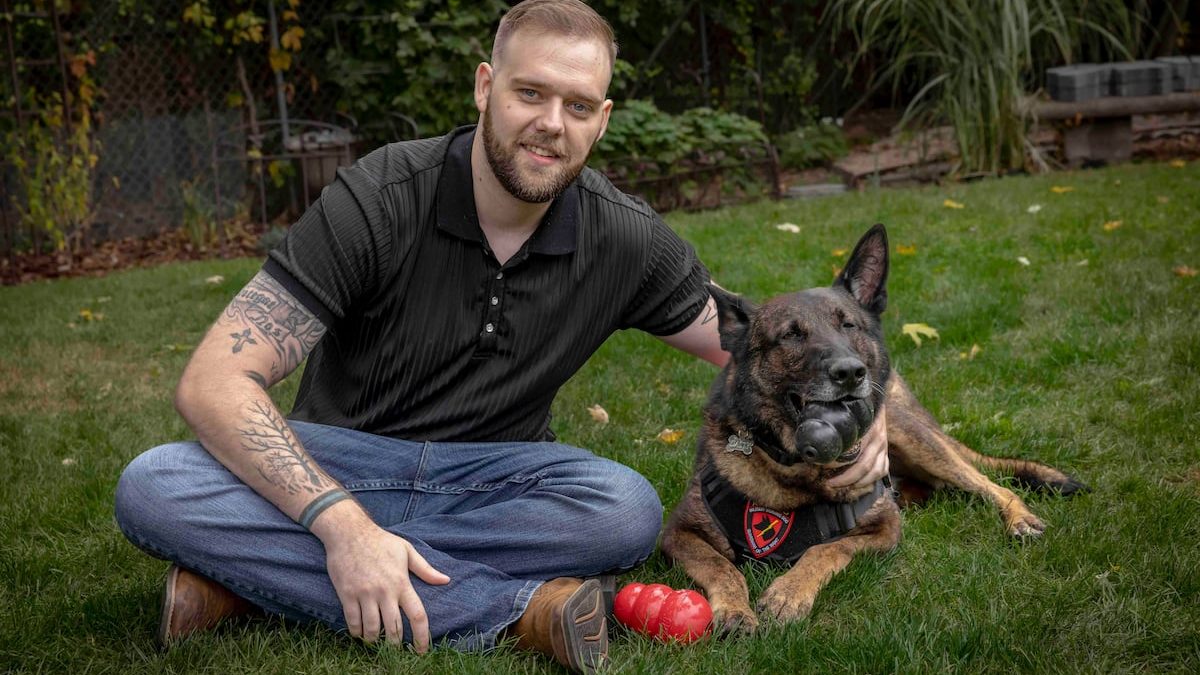Army Sgt. Michael Fletcher said goodbye to his military working dog Dasty in February 2022, after forging a bond unlike any he’d had with his previous two working dogs.
“I didn’t think I was ever going to see him again,” Fletcher said.
Their relationship began in 2018 when Dasty, a 5-year-old male Dutch Shepherd, met Fletcher while he was stationed at Fort Huachuca in Cochise County, Arizona.
At first, it was all business, not unlike his previous two dogs. But soon, a camaraderie began developing and continued as they were both sent to complete the Patrol Explosive Detection Dog-Enhanced Course, which trains military dogs to work off-leash for up to a football field away from their handler.
As a result of the training, Dasty – with the help of an e-collar- could be instructed to sit and turn toward Fletcher by a tone emitted from the collar, at which point Fletcher would guide Dasty toward an area where he wanted Dasty to search for explosives.
Even as his bond with Dasty grew, the objective of their working relationship was never lost on Fletcher.
“The Army teaches you to look at them like tools, right, tools for war,” Fletcher said. “They even have serial numbers.”
The goal was to save lives, he said. If a military dog had to make the ultimate sacrifice, they would.
In 2019, Fletcher and Dasty deployed to Afghanistan as part of the 483rd Military Police Detachment, working as a route clearance enabler out of Forward Operating Base Shank in the Logar Province.
The deployment was difficult for Fletcher. His wife Johanna was pregnant with their first child at the time. He missed the birth.
Fletcher said it was a lonely stretch, but he leaned on Dasty for companionship and a sense of home, all of which helped Fletcher with his mental health. This, Fletcher said, brought them close together, closer than he’d ever been with previous dogs.
“It was a different connection,” Fletcher said.
Dasty was a pro on the battlefield. He located improvised explosive devices, saved lives, and when things got dicey, Dasty was unshakable.
Fletcher remembers Dasty standing stoically as bullets whizzed past them.
On another occasion, their vehicle rolled over. While Fletcher and his fellow service members were waiting for help, Dasty stood proudly on the window of the wrecked car, smiling as though nothing had happened.
But one of their most formative moments came on a scorching day
Fletcher was low on water but poured the last of it into a collapsible bowl for Dasty.
After he slurped it up, there was a small amount left.
Fletcher was thirsty and didn’t want to waste resources, so he drank the rest of the water, tasting Dasty’s slobber as he gulped it down.
“It was actually really delicious,” Fletcher said. “I know it sounds gross but that’s kind of like a bonding moment.”
Eventually, their time together ended, and in February 2022, Fletcher and Dasty parted ways.
Fletcher said he knew it was coming, since Fletcher was leaving the Army and Dasty was still in working shape.
Still, Fletcher said it was incredibly difficult.
He returned to the States and moved to Green Bay, Wisconsin, with his family, forging a new life.
But he kept tabs on his canine buddy, getting updates from a Dasty’s new handler, who was a friend of Fletcher’s.
Then, in 2024, Fletcher heard through the grapevine that Dasty was finally retiring.
Fletcher’s wife urged him to reach out to American Humane, an organization whose Military Working Dog Reunification Program reconnects retired military dogs with their previous handlers.
American Humane helped get the ball rolling and eventually, on Oct. 12, 2024, Dasty and Fletcher met for the first time in nearly two years.
“I was kind of nervous,” Fletcher said. “I didn’t know if he was going to be the same dog.”
Fletcher met a handler from American Humane and Dasty at an Airbnb in Green Bay, Wisconsin.
At first, Fletcher said Dasty was attached to the handler and paid little attention to him. But after the handler stepped away, Fletcher said they picked up right where they left off.
“I started giving him commands and that’s when it clicked,” Fletcher said. “That was pretty much it.”
Even though it was his same old friend, there were subtle differences, Fletcher said.
War had changed Dasty.
He was still the dog Fletcher had known, but he was also more skittish, his temperament more serious. He nipped sometimes. But the carefree, outgoing dog was underneath it all.
When Fletcher joined the Army in 2015, he never imagined he’d be a dog handler. Initially, he wanted to work as a Military Police, but when he was told that a Military Working Dog Handler position opened up – a rare occurrence, Fletcher said – he jumped at the opportunity.
He never knew he’d get a lifelong friend out of it.
Dasty is a full part of the Fletcher family now.
Fletcher says Dasty even recognizes Fletcher’s scent on his son, whose also grown close to the dog.
The two are inseparable, to the point that sometimes Dasty even annoys him, Fletcher said.
More than anything, Fletcher was excited to let Dasty kick his feet up and relax.
“Now he’s ready to be on our couch and get fat,” Fletcher said. “He did a lot of stuff.”
Riley Ceder is an editorial fellow at Military Times, where he covers breaking news, criminal justice and human interest stories. He previously worked as an investigative practicum student at The Washington Post, where he contributed to the ongoing Abused by the Badge investigation.
Read the full article here


